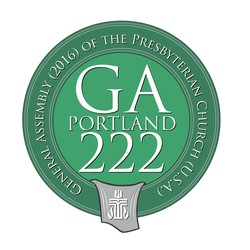After a two-year period of denominational soul-searching, the 222nd General Assembly of the Presbyterian Church (U.S.A.) is poised this June to consider dramatic changes to the ways the 1.66 million-member church conducts its ecclesial and mission work.
The aspiringly-named Assembly Committee on The Way Forward (Committee 4) will:
- Distill feedback from conversations initiated over the last two years by GA Moderator Heath Rada and from affinity groups such as NEXT Church, the Covenant Network of Presbyterians and The Fellowship.
- Examine GA-mandated evaluative reviews of the Office of the General Assembly (OGA) and the Presbyterian Mission Agency (PMA) and recommendations coming out of those reviews.
- Study research contained in a “PC(USA) Snapshot” compiled by the denomination’s Research Services office and the Committee on the Office of the General Assembly from nearly 3,500 Presbyterian respondents.
- Consider 10 prescriptive overtures submitted by presbyteries.
Out of all that material, the Way Forward committee and the Assembly itself will attempt to fashion solutions to counter the denomination’s decline, which includes:
- A 40 percent loss of members since Presbyterian reunion in 1983.
- Reduction of the General Assembly mission budget by half in the last 20 years.
- Reduction of national staff by two-thirds since 1994.
- Reduction of mid-council (presbyteries and synods) staffs.
- A 79 percent reduction in unrestricted mission support contributions (as opposed to investment income) over the last 18 years—$24 million in 1999 compared to $5 million in the proposed 2017 mission budget.
Perhaps the most dramatic change the Way Forward committee will consider is a proposal to merge the Office of the General Assembly—the ecclesial agency of the denomination)—and the Presbyterian Mission Agency—the mission arm. Proposals to that effect are coming from several places.
In its report (item 04-11), the Committee to Review the Presbyterian Mission Agency seeks the creation of a 15-member committee “to explore the possibility of a merger” between OGA and PMA. In the meantime, the report calls for an eight-member committee to provide a plan to restructure the PMA to provide corrective oversight to mitigate recent administrative issues including creation of an unauthorized corporation in which to channel “1001 New Worshiping Communities” funds, the cancelation of One Great Hour of Sharing promotional materials deemed racially insensitive and their subsequent redesign, and a sizable cost overrun for the 2013 Presbyterian Youth Triennium.
The Committee to Review the Office of the General Assembly report (item 04-12), while taking no position on the merger, “commends to the church the merits of deliberate and thoughtful conversation on the subject.”
An overture from Santa Fe Presbytery (item 04-07) is more matter-of-fact. It calls for merger of OGA and PMA, effective at the end of the 2018 General Assembly. The Presbyterian Mission Agency Board and the Committee on the Office of the General Assembly would be dissolved and succeeded by a Council of the General Assembly with the GA moderator as chair, the GA vice-moderator as vice-chair and the GA stated clerk as head-of-staff, with the title Stated Clerk/Director of Presbytery Mission Support.
An overture from St. Andrew Presbytery (item 04-08) calls for the GA “to hire a top-tier national consultant … to assess and make recommendations on the nature, function and relationship of the OGA and the PMA to each other and to the presbyteries and congregations … including the need for their continued existence as two distinct entities.”
Foothills Presbytery has submitted a package of eight overtures with the aim, it says, “of engaging our denomination in the sustained work of reform, renewal and modernization.” Seven of the eight overtures have been referred to the Way Forward committee:
- Item 04-01 calls for each GA to be organized around one of the Six Great Ends of the Church (F-1.0304), with the main business of each Assembly “to discuss and to explore ways to enable PC(USA) congregations to fulfill more faithfully and effectively the Great End which is the theme for that Assembly.” Constitutional amendments would only be entertained every third Assembly (every six years) and would have to have the endorsement of 15 percent of the 172 presbyteries to be considered.
- Item 04-02 would add a fifth category of advisory delegates to the GA – Presbyter Advisory Delegates – to the current ones: young adult, theological student, missionary and ecumenical advisory delegates. For each General Assembly, 20 percent of the presbyteries could designate their chief executive to be an advisory delegate.
- Item 04-03 would require the affirmative votes of a two-thirds majority of the presbyteries and approval by two consecutive General Assemblies to amend the Book of Order. Currently, amending the Book of Order requires a majority vote of one General Assembly and then ratification by a majority of the presbyteries. An overture from the Presbytery de Cristo (04-10) proposes much the same rubric.
- Item 04-04 would grant presbyteries the right to “abstain” when voting on proposed amendments to the Constitution.
- Item 04-05 would grant presbyteries and synods the ability to submit overtures to amend or suspend the General Assembly Standing Rules. Currently, the Assembly itself adopts its standing rules and amends them as it so chooses.
- Item 04-06 would grant presbyteries and synods the ability to submit overtures to amend, delete or suspend sections of the Manual of the General Assembly. Currently, the General Assembly has sole responsibility for its manual (of operations).
Item 04-09 calls for the creation of a “General Assembly Reform Coordinating Committee” charged to “reform, renew and refresh the practice of our Reformed polity for the 21st century.” The centerpiece of the committee’s work would be a series of regional gatherings “to study the core principles of our historic polity, to reflect upon the sweeping changes” affecting church and society and to advise the reform committee on “the content and organization of the Constitution and the creation of a 10-year strategic mission plan for the PC(USA)” and to devise “the most effective structures to faithfully and boldly uphold our Reformed polity and practice.”

